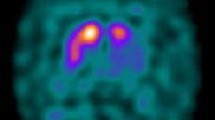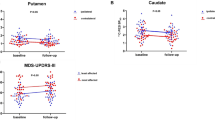Abstract
Purpose
We hypothesized that combining pre- and postsynaptic quantitative information about the dopaminergic system would provide a higher diagnostic accuracy in the differential diagnosis of parkinsonism than specific striatal D2 receptor binding alone. Therefore, the aim of the study was to introduce new semi-quantitative parameters and evaluate their ability to discriminate between Parkinson’s disease (IPS) and non-idiopathic parkinsonian syndromes (non-IPS).
Methods
In 100 patients (69 IPS, 31 non-IPS), postsynaptic [123I]IBZM and presynaptic [123I]FP-CIT SPECT scans were evaluated by observer-independent techniques. The diagnostic performances of striatal dopamine transporter (DAT) and D2 receptor binding, their respective asymmetries, and a combination of pre- and postsynaptic asymmetry were evaluated with ROC analyses. A logistic regression model was generated combining factors to calculate the probability for each patient of belonging to either diagnostic group.
Results
D2 receptor binding provided a sensitivity of 87.1% and a specificity of 72.5% with an area under the curve (AUC) of 0.866. The AUCs of other single parameters were lower than that of D2 binding. A gain of diagnostic power (p = 0.026) was reached with a model combining pre- and postsynaptic asymmetries and D2 binding (sensitivity 90.3%, specificity 73.9%, AUC 0.893).
Conclusion
The combination of quantitative parameters of presynaptic DAT and postsynaptic D2 receptor binding demonstrates superior diagnostic power in the differentiation of patients with IPS and non-IPS than the established approach based on D2 binding alone. Striatal D2 receptor binding and the combination of DAT and IBZM binding asymmetries are the factors contributing most in separating these diagnostic groups.

Similar content being viewed by others
References
Rajput AH, Rozdilsky B, Rajput A. Accuracy of clinical diagnosis in parkinsonism—a prospective study. Can J Neurol Sci 1991;18:275–8.
Jankovic J, Rajput AH, McDermott MP, Perl DP. The evolution of diagnosis in early Parkinson disease. Parkinson Study Group. Arch Neurol 2000;57:369–72.
Bokobza B, Ruberg M, Scatton B, Javoy-Agid F, Agid Y. [3H]spiperone binding, dopamine and HVA concentrations in Parkinson’s disease and supranuclear palsy. Eur J Pharmacol 1984;99:167–75.
Quinn N. Multiple system atrophy-the nature of the beast. J Neurol Neurosurg Psychiatry 1989;Suppl:78–89
Schwarz J, Kraft E, Vogl T, Arnold G, Tatsch K, Oertel WH. Relative quantification of signal on T2-weighted images in the basal ganglia: limited value in differential diagnosis of patients with parkinsonism. Neuroradiology 1999;41:124–8.
Booij J, Tissingh G, Winogrodzka A, van Royen EA. Imaging of the dopaminergic neurotransmission system using single-photon emission tomography and positron emission tomography in patients with parkinsonism. Eur J Nucl Med 1999;26:171–82.
Brucke T, Djamshidian S, Bencsits G, Pirker W, Asenbaum S, Podreka I. SPECT and PET imaging of the dopaminergic system in Parkinson’s disease. J Neurol 2000;247 Suppl 4:IV/2–7.
Tatsch K. Imaging of the dopaminergic system in parkinsonism with SPET. Nucl Med Commun 2001;22:819–27.
Tatsch K, Asenbaum S, Bartenstein P, Catafau A, Halldin C, Pilowsky LS, et al. European Association of Nuclear Medicine procedure guidelines for brain neurotransmission SPET using 123I-labelled dopamine D2 receptor ligands. Eur J Nucl Med Mol Imaging 2002;29:BP23–9.
Plotkin M, Amthauer H, Klaffke S, Kuhn A, Ludemann L, Arnold G, et al. Combined 123I-FP-CIT and 123I-IBZM SPECT for the diagnosis of parkinsonian syndromes: study on 72 patients. J Neural Transm 2005;112:677–92.
Kim YJ, Ichise M, Ballinger JR, Vines D, Erami SS, Tatschida T, et al. Combination of dopamine transporter and D2 receptor SPECT in the diagnostic evaluation of PD, MSA, and PSP. Mov Disord 2002;17:303–12.
Bettin S, Kampfer I, Seese A, Schafer A, Reuter M, Lossner J, et al. Striatal uptake of I-123-beta-CIT and I-123-IBZM in patients with extrapyramidal symptoms. Nuklearmedizin 1997;36:167–72.
Knudsen GM, Karlsborg M, Thomsen G, Krabbe K, Regeur L, Nygaard T, et al. Imaging of dopamine transporters and D2 receptors in patients with Parkinson’s disease and multiple system atrophy. Eur J Nucl Med Mol Imaging 2004;31:1631–8.
Koch W, Radau PE, Hamann C, Tatsch K. Clinical testing of an optimized software solution for an automated, observer-independent evaluation of dopamine transporter SPECT studies. J Nucl Med 2005;46:1109–18.
Popperl G, Radau P, Linke R, Hahn K, Tatsch K. Diagnostic performance of a 3-D automated quantification method of dopamine D2 receptor SPECT studies in the differential diagnosis of parkinsonism. Nucl Med Commun 2005;26:39–43.
Buchert R, Berding G, Wilke F, Martin B, von Borczyskowski D, Mester J, et al. IBZM tool: a fully automated expert system for the evaluation of IBZM SPECT studies. Eur J Nucl Med Mol Imaging 2006;33:1073–83.
Tatsch K, Asenbaum S, Bartenstein P, Catafau A, Halldin C, Pilowsky LS, et al. European Association of Nuclear Medicine procedure guidelines for brain neurotransmission SPET using 123I-labelled dopamine D2 transporter ligands. Eur J Nucl Med Mol Imaging 2002;29:BP30–5.
Radau PE, Linke R, Slomka PJ, Tatsch K. Optimization of automated quantification of 123I-IBZM uptake in the striatum applied to parkinsonism. J Nucl Med 2000;41:220–7.
Larisch R, Klimke A. Clinical impact of cerebral dopamine-D2 receptor scintigraphy. Nuklearmedizin 1998;37:245–50.
Schwarz J, Tatsch K, Arnold G, Ott M, Trenkwalder C, Kirsch CM, et al. 123I-iodobenzamide-SPECT in 83 patients with de novo parkinsonism. Neurology 1993;43:S17–20.
Schelosky L, Hierholzer J, Wissel J, Cordes M, Poewe W. Correlation of clinical response in apomorphine test with D2-receptor status as demonstrated by 123I IBZM-SPECT. Mov Disord 1993;8:453–8.
Schneider JA, Watts RL, Gearing M, Brewer RP, Mirra SS. Corticobasal degeneration: neuropathologic and clinical heterogeneity. Neurology 1997;48:959–69.
Tissingh G, Booij J, Bergmans P, Winogrodzka A, Janssen AG, van Royen EA, et al. Iodine-123-N-omega-fluoropropyl-2beta-carbomethoxy-3beta-(4-iodophenyl)tropane SPECT in healthy controls and early-stage, drug-naive Parkinson’s disease. J Nucl Med 1998;39:1143–8.
Rinne UK, Laihinen A, Rinne JO, Nagren K, Bergman J, Ruotsalainen U. Positron emission tomography demonstrates dopamine D2 receptor supersensitivity in the striatum of patients with early Parkinson’s disease. Mov Disord 1990;5:55–9.
Antonini A, Schwarz J, Oertel WH, Pogarell O, Leenders KL. Long-term changes of striatal dopamine D2 receptors in patients with Parkinson’s disease: a study with positron emission tomography and [11C]raclopride. Mov Disord 1997;12:33–8.
Ichise M, Kim YJ, Ballinger JR, Vines D, Erami SS, Tanaka F, et al. SPECT imaging of pre- and postsynaptic dopaminergic alterations in L-dopa-untreated PD. Neurology 1999;52:1206–14.
Gonzalez AM, Berciano J, Figols J, Pazos A, Pascual J. Loss of dopamine uptake sites and dopamine D2 receptors in striatonigral degeneration. Brain Res 2000;852:228–32.
Pascual J, Berciano J, Grijalba B, del Olmo E, Gonzalez AM, Figols J, et al. Dopamine D1 and D2 receptors in progressive supranuclear palsy: an autoradiographic study. Ann Neurol 1992;32:703–7.
Varrone A, Marek KL, Jennings D, Innis RB, Seibyl JP. [123I]beta-CIT SPECT imaging demonstrates reduced density of striatal dopamine transporters in Parkinson’s disease and multiple system atrophy. Mov Disord 2001;16:1023–32.
Brucke T, Asenbaum S, Pirker W, Djamshidian S, Wenger S, Wober C, et al. Measurement of the dopaminergic degeneration in Parkinson’s disease with [123I]beta-CIT and SPECT. Correlation with clinical findings and comparison with multiple system atrophy and progressive supranuclear palsy. J Neural Transm Suppl 1997;50:9–24.
Seibyl JP, Marek KL, Quinlan D, Sheff K, Zoghbi S, Zea-Ponce Y, et al. Decreased single-photon emission computed tomographic [123I]beta-CIT striatal uptake correlates with symptom severity in Parkinson’s disease. Ann Neurol 1995;38:589–98.
Tissingh G, Bergmans P, Booij J, Winogrodzka A, van Royen EA, Stoof JC, et al. Drug-naive patients with Parkinson’s disease in Hoehn and Yahr stages I and II show a bilateral decrease in striatal dopamine transporters as revealed by [123I]beta-CIT SPECT. J Neurol 1998;245:14–20.
Rinne JO, Ruottinen H, Bergman J, Haaparanta M, Sonninen P, Solin O. Usefulness of a dopamine transporter PET ligand [18F]beta-CFT in assessing disability in Parkinson’s disease. J Neurol Neurosurg Psychiatry 1999;67:737–41.
Kim SE, Lee WY, Choe YS, Kim JH. SPECT measurement of iodine-123-beta-CIT binding to dopamine and serotonin transporters in Parkinson’s disease: correlation with symptom severity. Neurol Res 1999;21:255–61.
Pirker W. Correlation of dopamine transporter imaging with parkinsonian motor handicap: how close is it? Mov Disord 2003;18 Suppl 7:S43–51.
Asenbaum S, Brucke T, Pirker W, Podreka I, Angelberger P, Wenger S, et al. Imaging of dopamine transporters with iodine-123-beta-CIT and SPECT in Parkinson’s disease. J Nucl Med 1997;38:1–6.
Pirker W, Asenbaum S, Bencsits G, Prayer D, Gerschlager W, Deecke L, et al. [123I]beta-CIT SPECT in multiple system atrophy, progressive supranuclear palsy, and corticobasal degeneration. Mov Disord 2000;15:1158–67.
McNeill TH, Brown SA, Rafols JA, Shoulson I. Atrophy of medium spiny I striatal dendrites in advanced Parkinson’s disease. Brain Res 1988;455:148–52.
Brooks DJ. PET studies on the early and differential diagnosis of Parkinson’s disease. Neurology 1993;43:S6–16.
Rice JE, Thompson PD. 5: Movement disorders I: parkinsonism and the akinetic-rigid syndromes. Med J Aust 2001;174:357–63.
Rinne JO, Hietala J, Ruotsalainen U, Sako E, Laihinen A, Nagren K, et al. Decrease in human striatal dopamine D2 receptor density with age: a PET study with [11C]raclopride. J Cereb Blood Flow Metab 1993;13:310–4.
Wong DF, Young D, Wilson PD, Meltzer CC, Gjedde A. Quantification of neuroreceptors in the living human brain: III. D2-like dopamine receptors: theory, validation, and changes during normal aging. J Cereb Blood Flow Metab 1997;17:316–30.
Volkow ND, Wang GJ, Fowler JS, Logan J, Gatley SJ, MacGregor RR, et al. Measuring age-related changes in dopamine D2 receptors with 11C-raclopride and 18F-N-methylspiroperidol. Psychiatry Res 1996;67:11–6.
Ichise M, Ballinger JR, Tanaka F, Moscovitch M, St George-Hyslop PH, Raphael D, et al. Age-related changes in D2 receptor binding with iodine-123-iodobenzofuran SPECT. J Nucl Med 1998;39:1511–8.
Acknowledgement
P. Radau gratefully acknowledges financial support from Hermes Medical Solutions (Stockholm, Sweden).
Author information
Authors and Affiliations
Corresponding author
Rights and permissions
About this article
Cite this article
Koch, W., Hamann, C., Radau, P.E. et al. Does combined imaging of the pre- and postsynaptic dopaminergic system increase the diagnostic accuracy in the differential diagnosis of parkinsonism?. Eur J Nucl Med Mol Imaging 34, 1265–1273 (2007). https://doi.org/10.1007/s00259-007-0375-8
Received:
Accepted:
Published:
Issue Date:
DOI: https://doi.org/10.1007/s00259-007-0375-8




